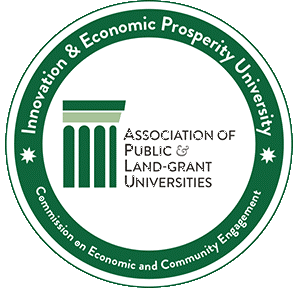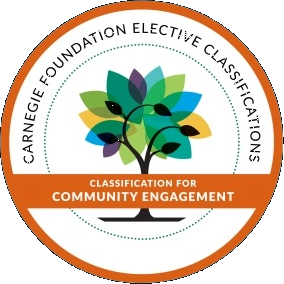As the nation's premier land-grant institution, Michigan State University has long taken seriously questions regarding the responsibility of public universities to the constituencies and society they serve. The University's commitment to serving the public with the knowledge resources of a major research university remains vital. This commitment is captured in the MSU Promise, which states:
MSU will be an exemplary "engaged university," transforming and strengthening outreach partnerships to address key Michigan needs and developing broadly applicable models.
In recent years, MSU has taken the lead in helping to foster a national discussion about what it means for an institution to meet its responsibilities to both the public and scholarship through engagement. This page contains descriptions of and links to the on-line versions of publications and documents the University has contributed to this discussion.
Reports
Association of Public and Land-grant Universities Innovation and Economic Prosperity (IEP) Designation Self-Study: Michigan State University Application
The Association of Public and Land-grant Universities (APLU) established the Innovation and Economic Prosperity (IEP) universities designation to help higher education institutions strengthen their strategies and practices in economic and community development and to provide recognition to those that demonstrate exemplary institution-wide commitment to regional economic engagement. Since 2013, the Association has recognized IEP designees during the APLU Annual Meeting, the world’s largest convening of public university presidents, provosts, and other senior administrators. A committee, co-chaired by Arnold Weinfeld, director for Workforce and Economic Development Partnerships, Office for Public Engagement and Scholarship, and Charles Hasemann, associate vice president for Innovation and Economic Development, Office of Research and Innovation, was organized to conduct a self-study that would shape MSU's application for the designation. A writing team led by Weinfeld and Laurie Van Egeren, assistant provost for University-Community Partnerships, prepared and submitted MSU’s application. Michigan State University was awarded APLU's IEP universities designation in 2023.
Carnegie Community Engagement Re-Classification Self-Study: Michigan State University Application
Since first introduced in 2006, the Community Engagement Classification of the Carnegie Foundation for the Advancement of Teaching has become an important indicator of institutional commitment to and performance of community-engaged scholarship and university outreach in the United States. Over time the implementation of the classification evolved. The Foundation partnered with the New England Resource Center for Higher Education (NERCHE) to administer the classification. The length of institutions’ classification was determined to be ten years, with re-classification available thereafter. NERCHE adopted a five-year cycle for calling for applications for classification and re-classification. In 2014, a writing team led by Associate Provost Hiram E. Fitzgerald and Burton Bargerstock, director of MSU’s National Collaborative for the Study of University Engagement, prepared and submitted MSU’s self-study and application for re-classification. In January 2015, Michigan State University was once again awarded the Classification. The American Council on Education subsequently assumed responsibility for adminsitering the Community Engagement Classification.
Carnegie Community Engagement Classification Pilot Self-Study: Michigan State University Application
In 2004, as part of an overall revision of its classification system, the Carnegie Foundation for the Advancement of Teaching began developing a new Community Engagement Classification. This elective classification invites interested higher education institutions to conduct a self-study in order to describe and represent the quality and extent of their outreach and engagement work in the hopes of being classified by the Foundation as a community-engaged institution. In 2005, MSU and 12 other colleges and universities helped to develop and test a set of indicators and a framework for the classification. Hiram E. Fitzgerald, associate provost for University Outreach and Engagement, and Diane L. Zimmerman, director (now director emeritus) of the National Collaborative for the Study of University Engagement, represented Michigan State University in this pilot project and are the primary authors of the MSU self-study report.
After submitting its report for the original pilot that resulted in the new classification, MSU submitted additional materials about service-learning and a grid describing representative MSU-community partnerships, to complete its successful application for the 2006 inaugural class of classified institutions.
NCA Re-Accreditation Self-Study: Criterion Five (Engagement and Service)
Michigan State University is accredited by the Higher Learning Commission of the North Central Association (HLC/NCA) of Colleges and Schools. Every 10 years the University voluntarily undergoes an institution-wide accreditation review, one component of which is a self-study report for the evaluation committee. Every unit on campus contributes to the re-accreditation self-study. To maintain its accreditation the University must provide evidence-based assessment of five criteria, and must demonstrate that it is using those assessment outcomes for continuing improvement. Criterion 5 of the self-study addresses engagement and service. The report from the latest review, in 2005, indicates that MSU has fulfilled all requirements for its 10-year re-accreditation.
University Outreach and Engagement prepared guidelines to help unit administrators respond to Criterion 5. Tools and techniques include a checklist for compliance, a constituent analysis guide, and a guide to building constituent relationships.
- View tools for preparing expedited responses to HLC/NCA Criterion 5
- View tools for preparing in-depth responses to HLC/NCA Criterion 5
University Outreach at Michigan State University: Extending Knowledge to Serve Society
This report by The Provost's Committee on University Outreach articulates an intellectual foundation for outreach and makes recommendations for further strengthening university outreach at Michigan State University
The report consists of two major sections: Defining Dimensions of University Outreach and Strategic Directions for Strengthening University Outreach at Michigan State University. The Defining Dimensions section establishes the conceptual foundation of the Committee's thinking; the Strategic Directions discussion addresses the leadership required for maintaining outreach excellence at MSU. Content and audience are discussed in the Preface. The Preface also includes an overview of the history and status of outreach at Michigan State with emphasis on describing the effort over the past decade to create a new model for outreach. A postscript briefly discusses The Twenty-first Century University and Outreach.
This is a reprint of the original 1993 publication. With the exception of minor typographical revisions, the content and pagination remain unchanged from the original.
Background Papers: University Outreach at Michigan State University: Extending Knowledge to Serve Society
A companion to the 1993 report (University Outreach at Michigan State University: Extending Knowledge to Serve Society), this volume contains background material that was not included in the 1993 final report to the Provost's Office. Although this material was not officially submitted, it provides additional depth and breadth to the 1993 report.
Guides
Points of Distinction: A Guidebook for Planning and Evaluating Quality Outreach
As higher education becomes more engaged with the communities it serves, well-planned outreach initiatives become increasingly important. But tools for planning and assessing the quality and impact of outreach efforts have been limited. Such planning and assessment are necessary to support and achieve standards of high quality and to evaluate faculty work for promotion and tenure and various accrediting bodies.
With Points of Distinction: A Guidebook for Planning and Evaluating Quality Outreach, a faculty group at Michigan State University has developed helpful tools to assist academic units, faculty, and the higher education community plan, monitor, evaluate, and reward outreach efforts. Published in 1996, revised in 2000, and reprinted with minor typographical revisions in 2009, this 50-page guidebook is divided into three sections: The Academic Unit: Planning and Evaluating the Outreach Enterprise; The Individual: Planning and Evaluating Faculty Outreach Efforts; and The Project: Evaluating Quality Outreach. A four-page matrix describes the dimensions of quality outreach: significance, context, scholarship, and impact. An appendix includes tools for defining outreach, unit planning and priority setting, rewarding quality outreach, evaluating unit outreach, developing a faculty outreach portfolio, and evaluating individual outreach.
The University Professional and Continuing Education Association (UPCEA); formerly University Continuing Education Association recognized Points of Distinction with its 1998 Innovations Award.
- Four Dimensions of Quality Outreach (The Matrix) — Reprinted from the Points of Distinction Guidebook
Proceedings
Fulfilling Higher Education's Covenant with Society: The Emerging Outreach Agenda Summary of the Capstone Symposium of the W.K. Kellogg Foundation - MSU Lifelong Education Grant
In 1988, the W.K. Kellogg Foundation awarded Michigan State University a $10.2 million grant to help support an institution-wide realignment process aimed at broadening, strengthening, and more fully integrating outreach as a primary mission of each of its major academic units. In October 1995 Michigan State celebrated the completion of its Kellogg Foundation grant with a capstone symposium designed to focus on institutional strategies to strengthen and integrate outreach. The intent was to share what MSU has learned from its own efforts as well as learn from similar efforts at other universities. Fulfilling Higher Education's Covenant with Society: The Emerging Outreach Agenda was published in 1996 as both an archival repository of the symposium and a reference tool to promote continued dialogue about and development of higher education's outreach agenda.
Rather than providing full text of the symposium's general and concurrent sessions, the 186 pages of Fulfilling Higher Education's Covenant with Society are comprised of short summaries organized into the following major sections: Redefining and Repositioning Outreach in the University; Intellectual Challenges in the Twenty-First Century: New Roles and Rewards for University Faculty; Leadership Roles and Responsibilities; Assessing Outreach; Problem-Focused Community Collaborations; Instructional Outreach; Change Model; Higher Education: Purpose and Promise in a Changing Society. A publication prologue, epilogue, and appendices are also included.
Archived Periodicals
Outreach Linkages
Outreach Linkages (1998-2000) was a news periodical published by University Outreach and Engagement for the Michigan State University community. Each edition focused on a particular theme related to the outreach mission of the University, and features articles about the outreach work of MSU faculty and staff.









